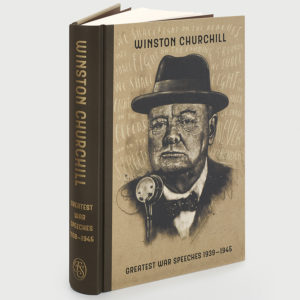
Finest Hour 191
The Unknown Chancellor

Winston Churchill, Parliament Square, London © Sue Lowry & Magellan PR
January 1, 1970
Finest Hour 191, First Quarter 2021
Page 48
Review by Mark Klobas
Mark Klobas teaches history at Scottsdale College.
Hugh Gault, Kingsley Wood: Scenes from a Political Life, 1925–1943, Gretton Books, 2017, 564 pages, £25. ISBN 978–0956204196
Readers of Finest Hour well know that Winston Churchill has not wanted for biographers. The same is true for the overwhelming majority of his wartime cabinet. Most of them wrote their memoirs after the war, and several have also been the subject of substantial biographies. The most notable exception is Sir Kingsley Wood, Churchill’s first Chancellor of the Exchequer. Wood’s sudden death in September 1943 precluded an autobiography, while the non-existence of any personal papers left by Wood has long discouraged historians from undertaking studies of his life.
Recently, however, Hugh Gault filled the vacuum by writing a two-volume biography of Wood. The first volume, published in 2014, covered Wood’s initial career as a solicitor, his emergence as an expert on industrial insurance, and his first years as a Member of Parliament. The second volume begins with Wood’s appointment as Parliamentary Secretary to the Minister of Health, Neville Chamberlain, at the start of 1925, and covers the remaining eighteen years of his life. Since Wood spent all but two of these years in government, Gault has a wide range of Wood’s various roles and responsibilities to cover. The result reads like a political history of interwar Britain.

2024 International Churchill Conference
Though Gault’s focus often shifts from Wood, his description of events helps to illustrate how central Wood’s ministerial activities were to national developments. As Postmaster General in the early 1930s, Wood was active in reforming the Post Office, promoting telephone usage, and supervising the recently established British Broadcasting Corporation. After being named Minister of Health in 1935, Wood pursued an active campaign of slum clearance and took up campaigns to promote public fitness. Gault details throughout this period the growing esteem in which Wood was held by his colleagues and in the press and notes the occasional mention of a possible premiership in Wood’s political future.
It was as a rising star in the Conservative party that Wood was appointed Secretary of State for Air in 1938. The importance of this office had grown with the push to rearm Britain in the face of the increasing threat posed by Nazi Germany. Wood’s predecessor, Lord Swinton, had resigned after mounting public criticism over delays in aircraft production. Gault credits Wood with a number of important decisions, including the shift in emphasis from producing bombers to fighters and the inauguration of the Empire Air Training Scheme. This last proved to be a valuable source of pilots for Britain throughout the Second World War. Though Gault regards Wood as a success in the job, the wartime demands exhausted Wood to the point that in April 1940 he exchanged offices with Sir Samuel Hoare and moved to the less-demanding position of Lord Privy Seal.
Wood’s time as Lord Privy Seal proved short. Within a month, political turmoil led to Winston Churchill replacing Neville Chamberlain as prime minister. Gault credits Wood as one of the key figures in Churchill’s elevation, most notably by forewarning him on 10 May of Chamberlain’s intention to corner him into supporting Lord Halifax. Wood’s own standing in the Conservative party made his appointment to some prominent office in the War Cabinet likely, and Churchill sent him to the Exchequer. Gault believes that Churchill and Wood made a good team: Wood’s administrative ability complemented Churchill’s political charisma and strategic vision. As Chancellor, Wood played an important role in balancing the allocation of resources between the civilian and military sectors. By adopting Keynesian policies in the 1941 Budget and the Pay-As-You-Earn (PAYE) approach to collecting taxes, Wood established enduring changes to Treasury policy. These achievements underscore why we have long needed a biography of Kingsley Wood, and Gault is to be commended for having undertaken the task. His coverage of Wood is highly sympathetic yet not entirely uncritical. Gault goes far in making the case for Wood as one of the leading Conservative politicians of Churchill’s era.
Subscribe
WANT MORE?
Get the Churchill Bulletin delivered to your inbox once a month.




